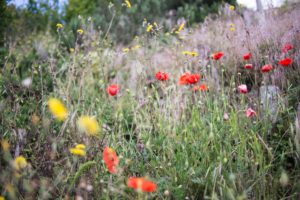
Photo by Ben White
SITTING ON MY SCREEN PORCH, I shut my Bible and gazed out at the spring grass trying to get a fresh start. I sighed and thought back to my harsh response to my husband earlier that day. I shouldn’t have said it the way I did. That wasn’t good. He didn’t mean to forget. I need to be more patient.
I was wrong. But . . . .No one is perfect – Right?
No, I was wrong. I shouldn’t have said that.
A squirrel climbed out on a limb of our camellia bush and jumped onto the bird feeder, causing seeds to drop all over the ground.
I shook my head at him. “You squirrels are causing a mess!”
But no one is perfect, right? Not even squirrels. I laughed. I guess we’re all just part of a fallen world.
Our Fallen World
Yes, since we live in a fallen world, we know we make mistakes. We know we do things wrong. But we also know no one is perfect. If we can just keep it to ourselves and try to do better, it will be okay—Right?
Well, maybe not.
Recently, I was confronted with an unwelcome reality. Through two different Bible studies– one about the Old Testament prophets and one in 1st John in the New Testament, the same message has been ringing loud and clear in my head. When I’m impatient, when I have a bad attitude, when I’m critical, if I have impure thoughts, it’s not just that I’m doing something wrong. It’s SIN. No, I might not be committing murder or robbery; I’m not cussing or lying, but as much as I’d rather shove it under the rug and shrug it off, I have to face it. It’s still SIN.
The prophets certainly didn’t shy away from that word. Over and over, they call Israel to repentance, enumerating their sins and reminding them of God’s mercy if they repent. It’s not enough to have religious rituals and say the right words, they say. God wants repentant hearts. God is merciful, but He’s also a righteous judge. The apostle John says in his epistle, “If we claim to be without sin, we deceive ourselves and the truth is not in us” (1 John 1: 6).
A Serious Subject
I cringe from the word sin though because when I use THAT word, I have to face the seriousness of my wrong behavior, attitude, or thoughts. I know God hates sin. And if I call it sin, I have to realize God sees it! He knows what I’m doing and thinking!
Even worse, Jesus sees it, and I must face the fact that this is what Jesus DIED for – my sin!
So that’s when I realize I must stop making excuses and take my sin more seriously. I must “take every thought captive” (2 Cor. 10:5). I must look for the “way of escape” God has provided for me when I’m tempted (1 Cor. 10:13). For He has told me to “be holy because I am holy” (1 Peter 1:16).
And when I do “sin,” as I know I will –when I get impatient, indulge in self pity or worry, lose my temper, tell a half-truth, then I need to “confess my sins to God. I can’t just ignore it and forget about it. What I do in secret is offensive to Him. The God I love is a Holy God and He cannot look upon my sin. My sin separates me from Him. I must bring it out of the darkness into the light. I need to repent, let God forgive me and turn away from it. For “if we confess our sins, He is faithful and just and will forgive us our sins and cleanse us from all unrighteousness” (1 John 1:9).
The Better Way
For those of us who don’t want to think about the word “sin” and don’t want to grieve God’s holiness, it begins by actually taking sin more seriously.
To begin with, we need to be more mindful of our actions and our words – checking them out through the mirror of God’s Word so we can walk on a straight path toward righteousness. And on a regular basis we must pray that God will “Blot out my transgressions, wash away all my iniquity, cleanse me with hyssop, and make me as white as snow” (Psalm 51:1-2, 7).
Search me, God, and know my heart; test me and know my anxious thoughts. See if there is any wicked way in me, and lead me in the way everlasting” (Psalm 139: 23-24).
When our marriage is in crisis and our hearts are breaking, we need to bathe our minds in truth and grace. My book, Broken Heart on Hold, Surviving Separation, will walk with you through this lonely time to give you honest encouragement






